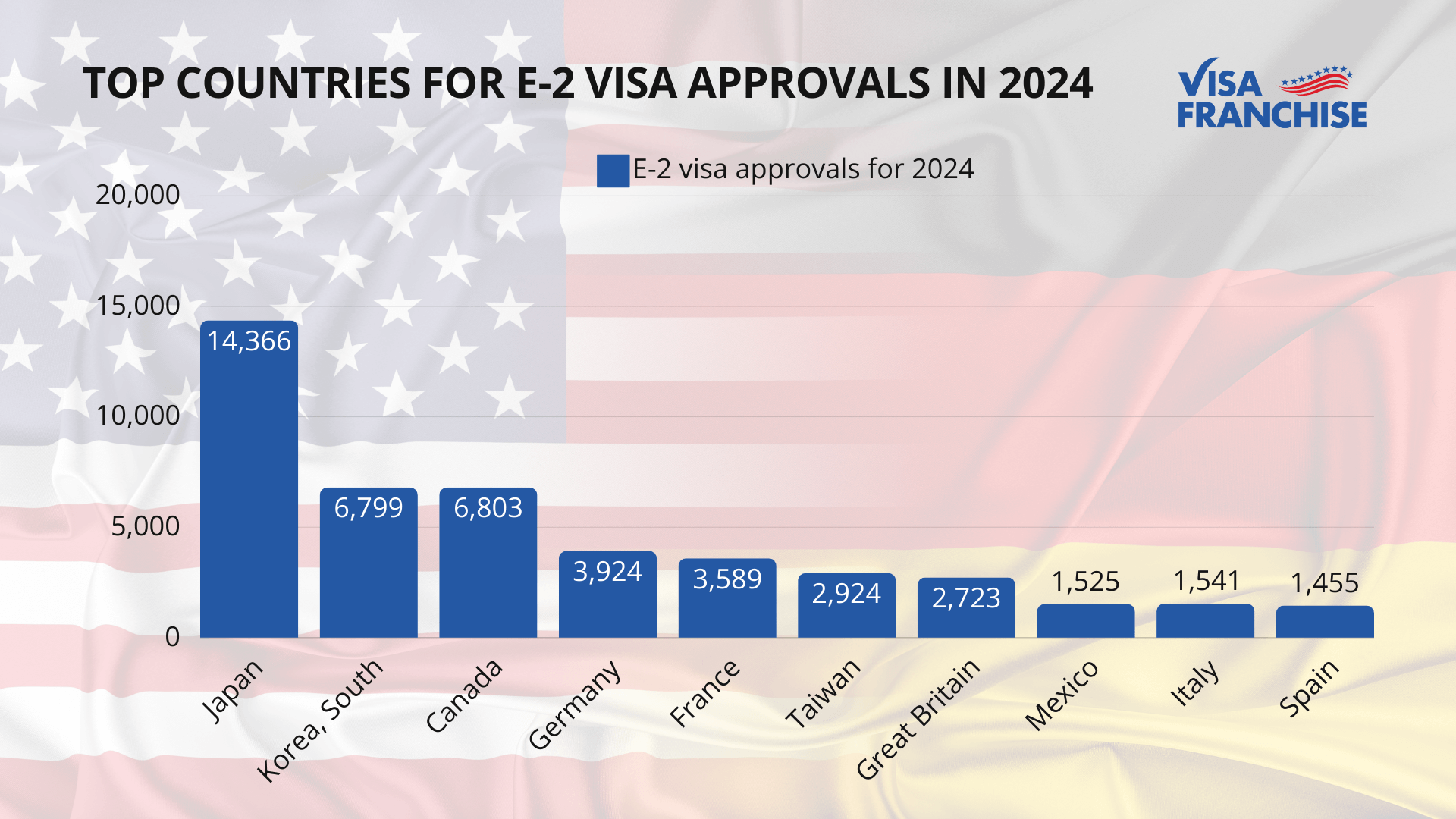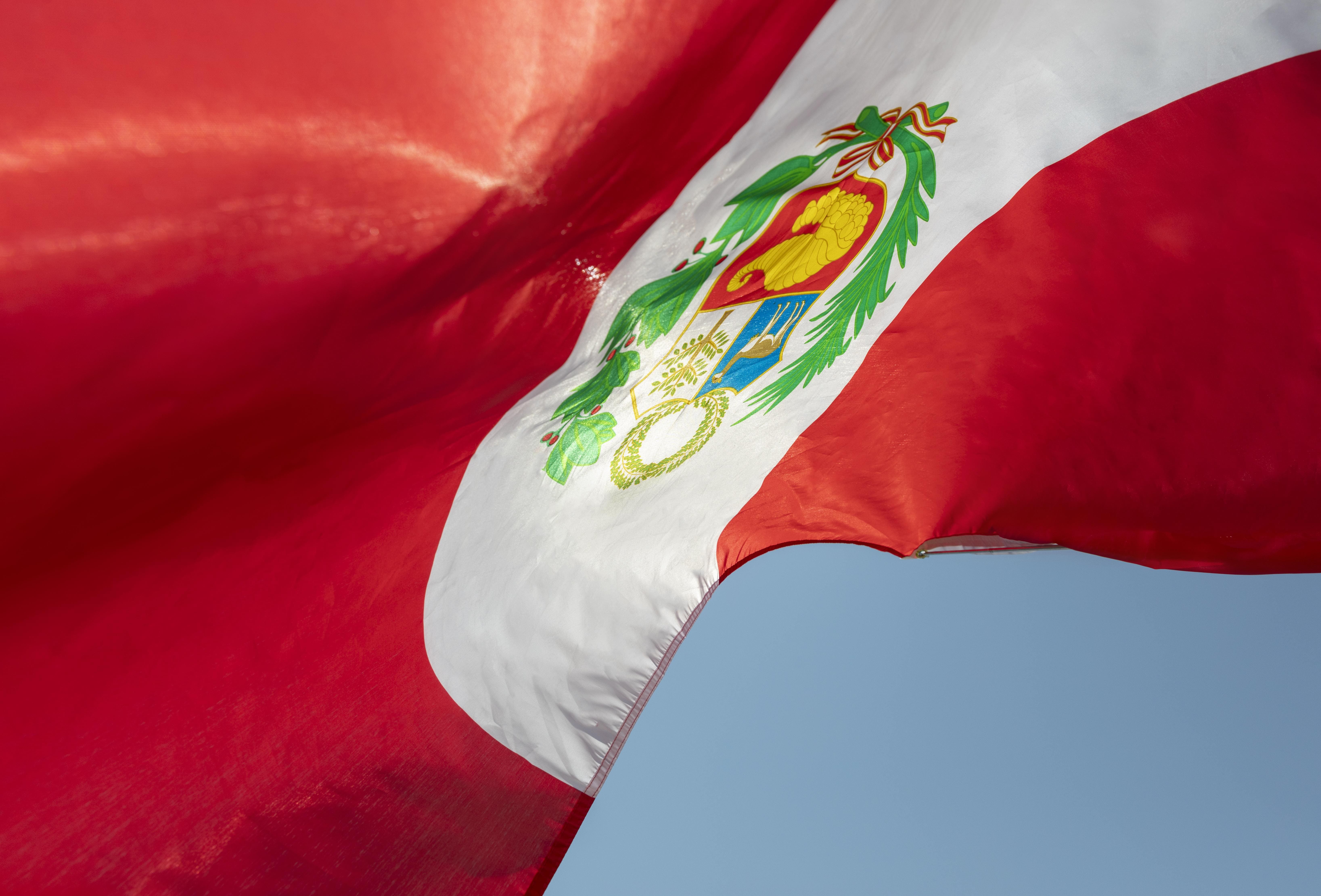The E-2 visa, established under the 1952 Immigration and Nationality Act to promote international economic collaboration, allows investors from treaty countries to live and work in the U.S. by establishing or investing in American businesses.
Initially limited to nations with formal treaties, the visa has expanded significantly with globalization, attracting entrepreneurs, corporate executives, and essential employees who contribute to the U.S. economy.
In 2024, E2 visa approvals reached a record high of 54,364 issuances, surpassing the 2023 total of 52,308, signaling a strong post-pandemic recovery, increased investor confidence, and the continued appeal of the United States as a business hub.
E-2 Visa Issuance Trends: 2024 and 2025 predictions
The COVID-19 pandemic in 2020 caused a sharp decline in E2 visa approvals, with issuances plummeting to 23,000 — the lowest figure in over a decade. The suspension of international travel and closure of U.S. consulates significantly disrupted the program, and its impact lingered into 2021.
As consulates began to reopen and operations resumed, approvals rose to 33,000, reflecting a 43% increase but still well below pre-pandemic levels. By 2022, the E-2 visa program experienced a strong rebound, with 46,000 visas issued — a 39% jump from the previous year — fueled by the lifting of travel restrictions and the resolution of application backlogs.
This upward trend continued in 2023, with approvals surging to 52,000, a clear sign of pent-up demand and improved processing efficiency. The momentum carried into 2024, setting a new record with 54,000 E-2 visas issued, marking a 4% increase over the previous year. This record-breaking figure underscores the program’s adaptability and highlights the enduring eagerness of global investors to engage with the U.S. economy.

Top Countries for E-2 Visa Approvals in 2024
The leading countries for E2 visa approvals in 2024 underscore the diversity and strength of global investment interest in the United States.
According to official data, Japan, South Korea, and Canada remain at the forefront, alongside key European and Asian nations. Japan leads the pack with 14,366 E-2 visas issued, reflecting the country’s long-standing economic partnership with the United States.
Japanese investors frequently utilize the E-2 program to manage subsidiaries or expand their business operations in various industries. Following Japan, South Korea secured 6,799 E-2 visas, driven by both entrepreneurial investors and corporate transfers.
In a recent YouTube livestream on our YouTube channel, Patrick Findaro, managing partner of Visa Franchise, highlighted the dual nature of the E-2 visa, explaining, “There’s the E-2 visa for investors, which covers entrepreneurs opening up a small business with their own capital, and then there’s the E-2 visa for essential employees and managers. For example, a German conglomerate might send essential employees to work in U.S.-based factories, or South Korean companies might send executives to manage operations at LG, or Japanese banks might transfer their executives to oversee business in the U.S.”

Canada Leads with 6,803 Approvals
Canada remains a major player with deep economic ties with the U.S., (6,803 approvals in 2024). This growth reflects rising living costs, limited opportunities for skilled workers, and higher tax rates in Canada.
Additionally, migration patterns among Canadians of South Asian origin are driving more investors to seek favorable business conditions and long-term growth prospects in the United States.
Germany and France Reflect European Economic Pressures
Germany and France secured 3,924 and 3,589 approvals, respectively.
These figures highlight economic pressure and political uncertainty in Europe, prompting investors to seek stability and growth opportunities in the U.S. market.
Taiwan’s Growth Driven by Tech and Manufacturing
Taiwan recorded 2,924 approvals in 2024 highlights growing interest from Asian investors.
Many Taiwanese investors are targeting business opportunities in the technology and manufacturing sectors within the United States.
UK Investors Adapt Amid Economic Uncertainty
The United Kingdom saw 2,723 E2 visa approvals. Despite a slight decline, British investors continue to pursue U.S. business ventures using the E-2 visa program.
Mexico Faces Economic Challenges
Mexico followed closely with 1,525 approvals. This demand from Mexican investors is a reflection of economic challenges and the continuous appeal of what U.S.-based business ventures represent — a path to stability and growth.
However, there was a decline in approvals which may not be be influenced by interest but rather the recent adjustment to the visa reciprocity schedule.
The increase to a four year validity period likely reduced the frequency of renewals — impacting the overall approval numbers.
Italy and Spain Complete the Top 10
Italy and Spain rounded out the top 10, with 1,541 and 1,455 E2 visa approvals, respectively. Both countries' investors are leveraging the program to access more favorable economic conditions in the United States. This range of countries highlights the global appeal of the E-2 visa program, driven by a mix of individual entrepreneurs, small business owners, and corporate expansions.
Year-on-Year Changes in E-2 Approvals: 2023 vs. 2024
The year 2024 saw notable shifts in E2 visa approvals among the top 10 countries, reflecting changes to economics and geopolitics. Japan experienced an 11% increase, rising from 12,905 approvals in 2023 to 14,366 in 2024.
This growth underscores Japan’s continued reliance on the E-2 visa for both corporate transfers and entrepreneurial investments. South Korea saw a modest increase of 2%, due to steady demand driven by the dual nature of the visa for small business owners and corporate executives.
Canada recorded a 9% increase, growing from 6,254 approvals to 6,803, reflecting Canada’s economic interdependence with the United States and several underlying factors such as rising living costs, limited opportunities for skilled workers, and higher tax rates.
Meanwhile, Germany’s approvals increased by 4%. Such change can be attribute to ongoing economic challenges at home that push investors toward the relative stability of the U.S. market.
Global Shifts in E-2 Approvals: Growth, Declines, and Driving Factors
On the other hand, France showed the most significant growth with a 26% increase, jumping from 2,851 approvals to 3,589. Political, economic and social instability have fueled the surge in applications.
Taiwan, with a 1% increase, reflects a steady demand as geopolitical tensions prompt Taiwanese investors to establish business footholds in the United States.
In contrast, the United Kingdom saw a 4% decline, dropping from 2,843 to 2,723. This decrease is likely influenced by economic uncertainty and reduced investor confidence. Mexico experienced the sharpest decline, falling by 30% from 2,185 to 1,525.
As Patrick Findaro explained, “Mexico got expensive. The peso went down in value, and it’s gotten a lot more expensive for someone to come up with the cash to invest in the U.S.”
Italy’s approvals fell by 15%, reflecting economic stagnation and political challenges that have discouraged investor activity. Spain recorded a modest 4% increase, signaling continued interest in U.S.-based business despite economic uncertainties at home.
These year-on-year changes highlight the complex factors influencing global investor decisions, from economic pressures to geopolitical stability.
E-2 Visa Trends in the Americas
Canada Maintains a Strong Lead in E-2 Visas
Between 2016 and 2024, Canadian investors received 21,518 E-2 visas, reflecting their consistent dominance in the Americas.
Deep economic ties with the U.S., coupled with favorable business conditions, have made Canada a reliable participant in the E-2 visa program.
Mexico Experiences a Significant Decline
Mexico saw a sharp 30% decline in E2 visa approvals, falling from 2,185 in 2023 to 1,525 in 2024. Economic challenges, particularly the depreciation of the peso, have made it difficult for investors to meet financial requirements.
Compounding this issue, the visa reciprocity schedule was revised to allow for a four-year validity period, compared to the previous one-year term.
Argentina’s Decline Driven by Economic Instability
Argentina’s E2 visa approvals fell by 12%, from 768 in 2023 to 676 in 2024. High inflation and currency devaluation undermine investor confidence, making it more difficult for Argentinians to pursue oppurtunity in the U.S.
Colombia Rebounds After Pandemic Delays
Colombia saw a 73% surge in E2 visa approval from 363 in 2023 to 629 in 2024. This is largely due to resolving consular backlogs caused by pandemic-related closures. Patrick Findaro, co-founder of Visa Franchise, noted the difficulties faced by Colombian investors, explaining, “There were serious issues with just processing the visas where the consulate was closed for so much time during COVID. I think it was almost two years.
Our clients had to look to apply in other consulates like Brazil or up in Canada. It was just like a total pain for our clients applying in Colombia. Then they even sent consulate staffers from other consulates to try to help with processing E-2 visas.”
With these delays now addressed, more Colombian investors are moving forward with their U.S. business ventures.
Chile Faces the Steepest Decline
Chile experienced a 45% drop in E2 visa approvals, from 310 in 2023 to 170 in 2024. This sharp decline is a result of ongoing consular processing delays and a slow recovery from pandemic disruptions, hindering application timelines.
Brazil’s Modest Decline Reflects Economic Challenges
Brazil recorded a slight 3% decline in E2 visa approvals from 146 in 2023 to 142 in 2024. However, Brazilian investors remain engaged in sectors like franchising, services, and hospitality. Growth has slowed but interest in U.S. business opportunities remains steady.
Trump’s Return: What Will Happen to the E-2 Visa?
With Donald Trump in office, questions naturally arise about how his administration might impact the E-2 visa program. Reflecting on his first term, the E-2 visa figures provide a clear baseline. In 2017, the first year of Trump’s presidency, there were 43,673 E-2 visas issued.
The number dipped slightly in 2018 to 41,181 but rebounded to 43,286 in 2019. The pandemic severely affected the latter part of his term, causing a dramatic decline in visa issuances in 2020 and 2021 due to travel restrictions and consular closures.
Despite the fluctuating numbers, approval rates for E-2 visas remained stable during Trump’s presidency, averaging between 87% and 90%.
Patrick explained this trend: “I think the applications are going to go up, and the approval rate should be kind of the same. Even during Trump's first term, it ranged between 87% to 90%. Over the last 10 years, it’s been like 87% to 93% for the adjusted approval rate for the E-2. That does include people being transferred as employees or managers, who have a higher approval rate. But for individual investors, you still have a very good shot.”
Trump’s Immigration Stance: Favoring Legal Pathways for Investors
Trump’s approach to immigration has always distinguished between legal and illegal pathways. Alaattin Kılıç, our Senior Manager of Marketing & Business Development, highlighted this distinction, noting: “There’s been a lot of talk in terms of how they’re going to approach the immigration system. They say Trump loves immigration, right? But he doesn’t like illegal immigration. So there has always been the talk of why don’t we facilitate investors, entrepreneurs, and top professionals and talent coming to the U.S., and then impose certain implications on the illegal side of things.”
This philosophy suggests that legal immigration programs like the E-2 visa should continue to thrive under the Trump administration. The focus likely remains on high-caliber international investors and entrepreneurs who contribute to the U.S. economy.
Predictions for the E-2 Visa Program in 2025
Driven by post-pandemic recovery, geopolitical shifts, and sustained interest in U.S. investment opportunities the E-2 visa program is set for growth in 2025. While many countries will see steady increases, others may continue to face challenges as these challenges continue to resolve.
Japan's Growth Driven by Entrepreneurs and Corporate Transfers
Japan saw an 11% increase in 2024 and is expected to reach 16,000 approvals in 2025. The country's reliance on the visa for entrepreneurs and corporate personnel transfers will likely cause continued growth for the E-2 program.
South Korea's Steady Climb
South Korea recorded a 2% rise this year along with a projection of 7,500 approvals in 2025. This reflects continued interest from individual investors and large corporations who key personnel to the U.S.
Canada's Continued Expansion and Political Uncertainty
Canada’s E-2 approvals are expected to grow from 6,803 to 7,400 in 2025. Aladdin Kılıç noted, “There’s always demand... serious entrepreneurs still want to move to the U.S. whether it’s making money for their family or providing good educational opportunities for their families.”
Additionally, rumors of Prime Minister Justin Trudeau's potential resignation add to political uncertainty, a key motivation for some investors to seek stability in the U.S market.
Germany and France Maintain Strong Interest
Experts project Germany’s approvals will rise modestly from 3,924 to 4,075, France saw 26% growth in 2024 and is set to reach over 4,500 approvals in 2025. Investor concerns in Europe’s political, economic, and social climate continue to drive interest in relocation to the U.S.
Mexico and Argentina Face Continued Economic Challenges
Despite a 30% decline in 2024, Mexico is expect to recover to recover to 1,700 approvals in 2025, although economic challenges like the peso's depreciation persist. They also forecast Argentina’s approvals will drop further to 500 due to ongoing inflation and currency instability.
Turkey's Growth Fueled by Diversification
Turkey’s E-2 approvals are anticipated to increase from 701 to 905. Aladdin Kılıç remarked, “Certain political changes and economic policies push people to diversify and seek a second option.” As a result, this trend highlights growing interest in U.S. investments in response to domestic uncertainties.
Israel and Thailand Show Steady Increases
Experts expect Israel’s approvals to rise to 800, reflecting continued interest due to interests in tech. They also project Thailand’s approvals will continue in an upwards trend toward517 in 2025, following a 6% increase in 2024.
New Zealand Benefits from Streamlined Processes
Experts anticipate New Zealand’s E-2 approvals will grow to 202, partly because improved consular processing facilitates smoother applications.
Conclusion
As the E-2 visa program reaches new heights in post pandemic growth and the world continues to adapt to changing economic and political landscapes, one thing remains clear: the United States remains a beacon for investors and entrepreneurs.
Furthermore, the record-breaking numbers of 2024 hint at a bright future driven by policy shifts, global trends, and resilience of those seeking opportunity. What will 2025 bring? The next chapter of the E-2 visa story. For those ready to take the leap, the possibilities remain open and more intriguing than ever.
Discover if you qualify to invest in a thriving U.S. franchise and secure your E-2 visa.
Check your eligibility
More Insights You Might Like
Explore related articles packed with expert advice, real stories, and practical tips to support your U.S. visa and relocation journey.





